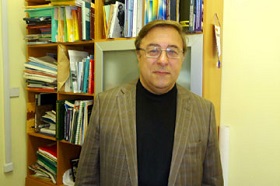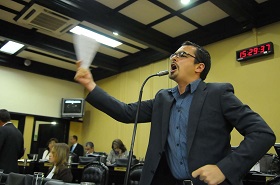Interview
Voters in Costa Rica have been largely unimpressed with the administration of the country’s current President Laura Chinchilla, with corruption topping their list of complaints. Butif the results of the first round of presidential elections are anythingto go by, we shouldn’t be expecting a change of government just yet. Nikolay Kalashnikov, Deputy Director for Research at the Centre for Political Studies, RAS Institute of Latin America, talked to the Russian International Affairs Council (RIAC) about the balance of power in the run-up to the second round of elections scheduled for April 2014.
Interview
Voters in Costa Rica have been largely unimpressed with the administration of the country’s current President Laura Chinchilla, with corruption topping their list of complaints. Butif the results of the first round of presidential elections are anythingto go by, we shouldn’t be expecting a change of government just yet. Nikolay Kalashnikov, Deputy Director for Research at the Centre for Political Studies, RAS Institute of Latin America, talked to the Russian International Affairs Council (RIAC) about the balance of power in the run-up to the second round of elections scheduled for April 2014.
What changes is Costa Rica expecting to see after the presidential elections? Will the new president be able to fix the mistakes of the Laura Chinchilla administration and pull the country out of its difficult economic position?
Costa Rica is indeed in a complicated economic position. At this point, it is virtually impossible to say who will win the elections because all predictions have thus proved irrelevant. Luis Guillermo Solis from the Citizens’ Action Party was in the lead after the first round, which was completely unexpected. Solis represents all the main left-wing forces in the country. The question can thus be phrased like this: “Will the representatives of the left-wing forces be able to put up a united front against the candidate from the ruling National Liberation Party, Johnny Araya?” If they manage to unite, then Solis is likely to win. In that case, economic policy is likely to undergo some changes, but I don’t foresee anything radical because the fight against poverty is a common priority among all the candidates. Some of the key tasks are to create jobs and reduce poverty to 20 per cent.
If Araya wins, the neoliberal strategy will endure. In his election programme, Araya announced that he was going to cut income tax in half, from 30 per cent to 15 per cent. He wants to attract foreign capital and stimulate local businesses. In any case, it’s too early to talk about the results. It will be easier to judge the results of the elections after the first 100 days of the presidency. Then we will be able to say how ready the new president is to follow through with his promises.Of course, much will depend on the political alignment in the parliament.
What will happen if the radical left strengthens its position?
Right up until the elections, everyone was saying that left-wing radical Jose Maria Villalta from the Broad Front party would win. At just 36 years old, he is a completely unexpected and brilliant political figure. He took only 0.6 per cent of the vote in 2010, but this year it was predicted that he would get over 20%. However, his views are too radical for Costa Rican voters. Costa Rica is politically centrist. Despite growing public discontent with the Laura Chinchilla administration, such a dramatic shift to the left is impossible at the moment.
What can you say about Russia-Costa Rica relations? Do they have any potential?
The Institute of Latin America believes that there is always potential to develop relations. However, it is worth noting that our relations are not at a very high level because Russia has little to offer Costa Rica, and besides, Costa Rica is traditionally oriented towards the United States. Of course, we have the potential to develop relations in tourism, because, like many other Central American nations, Costa Rica offers substantial recreational opportunities, and a large number of foreign tourists go there every year. Moreover, Costa Rica often holdsevents dedicated to environmental protection, as the country has rich flora and fauna. This is a popular topic for those who preferecotourism. I think the trajectory of our relations greatly depends on how Russia develops in the coming years. In the international arena, Russia and Costa Rica do not have any particular differences in opinion. No wonder some people call Costa Rica the ‘Switzerland of Central America’. Switzerland is famous for maintaining good diplomatic relations with everyone.
Interviewed by Maria Gurova, programme assistant at RIAC





